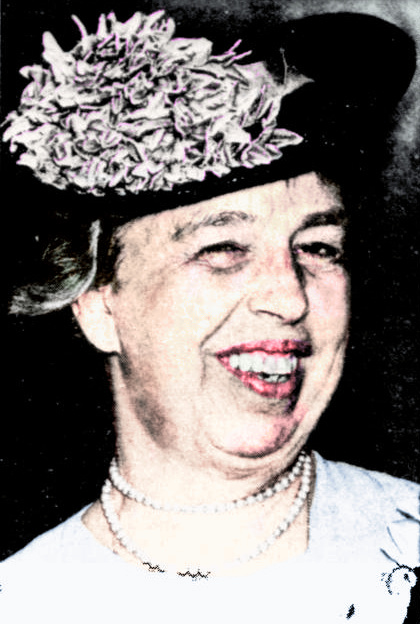
MY DAY
By Eleanor Roosevelt
November 1, 1939
Oklahoma City, Tuesday –
One of the things I noticed yesterday afternoon in visiting a Farm Security Administration project in Millington, Tenn., was that space was provided in every barn to store the farm machinery. Instead of finding it scattered in the fields or yards, where it gradually deteriorates, these farmers have their tools under shelter and it makes a great difference in the appearance of the farms. I must tell you more about this Farm Security project and the people on it, as well as something about the people who took me to see it, because the success or failure of these projects lies in the hands of the personnel administering them.
The home economics advisor for this district has worked here some time. Her name is Mrs. Brooks and you feel that she knows her job and that people have confidence in her. She said that someone asked her one day what she did and her reply was that she was everything from a missionary to a veterinary! The young man who is the farm advisor, Mr. Jakes, is only 23 years old and works closely with the county agent, Mr. Kerr, who was also with us. It is grand to find anyone of this age on this kind of a job because it requires enthusiasm and ingenuity and it means a great deal to the younger people growing up on the project to have someone to whom they can talk who will understand their problems.
The houses we visited were spic and span, poor to be sure, for many of these people have had but one harvest on the project. Out of 12 families, however, 5 who have had 2 years on this land, have paid all their indebtedness up to date, and the others are coming along with a good hope of catching up by the end of the second year.
These are not picked families and the life is none too easy. One family has 11 mouths to feed, another 9, and the smallest family I saw had five. This last family had succeeded in getting linoleum for the floor of the living room and a sofa and an upholstered chair which the woman had recovered herself. Even in the family of 11, they had found time to plant flowers around the house. When I left, the woman broke off one of her chrysanthemums and handed it to me, a gesture which showed the spirit of the community.
I felt they were all willing and anxious to help each other and anyone they felt needed their aid. They wanted to give as well as receive and were very proud of what they had accomplished in growing food for themselves and their stock to tide them over the winter. They are planning to improve their land by proper care and one man showed me his cotton seed ready for planting.
During the World War, the land they are now farming was an aviation field where our boys trained for service overseas. I could no not help thinking that its use today is perhaps more profitable to the nation. I like to see our boys learn to fly, but not for the purpose of destroying other people’s homes.
We left Memphis last night and have now arrived in Oklahoma City, Oklahoma. It is a gorgeous day and we are starting at once for a luncheon with my fellow Altrusans, who are responsible for sponsoring the lecture tonight.